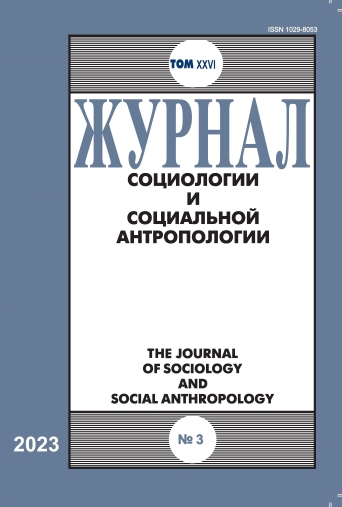Professionalization of Donation in Reproduction: A Narrative Analysis of Life Stories
Abstract
The formation of the institution of donation in the field of assisted reproductive technologies (ART) leads to the fact that some women participate in the procedure of oocyte donation and surrogacy (or both) repeatedly, i.e., they receive a certain experience of professionalization in this area. The material of the article is 9 in-depth semi-structured interviews with women who had more than two-time experience of oocyte donation and/or surrogacy, as well as 4 expert interviews with specialists in the field of ART. The authors focus on two research questions: how do donors construct an autobiographical narrative in which the history of regular donation fits in, and how do donors see the parameters of the emerging professional field that they must comply with, i.e. how donor narratives correlate and interact with external discursive frameworks. Finding answers to these questions involves a qualitative analysis of interviews with donors and physicians. The internal dynamics of the situation with professional donation today is also determined by the fact that the interest in the stability and predictability of “donors with good experience”, which has a material expression (reward), turns into a “conveyor belt effect” for the participants themselves, contrary to the values of increasing self-esteem and social status, which, in addition to money, serve as a powerful incentive for long-term participation in the program for female donors. The material and conclusions of the article are of interest to all specialists working in the field of reproductive medicine, as well as to specialists in the field of promoting this product on the market.
References
Башмакова Н.В., Полякова И.Г., Мазуров Д.О., Сыманюк Э.Э. Особенности мотивации и рекрутинг доноров ооцитов: клиника vs донор. Вопросы гинекологии, акушерства и перинатологии, 2023; 22(1): 40–45. https://doi.org/10.20953/1726-1678-2023-1-40-45.
Бердышева Е.С. (2012) От критики к аналитике: коммодификация жизненно важных благ как актуальная исследовательская проблема в новой экономической социологии. Экономическая социология, 13(1): 67–85.
Воронина О.А. (2018) «Новое» материнство: философско-антропологический взгляд. Философская школа. Гендерные исследования, 6: 104–109. https://doi.org/10.24411/2541-7673-2018-10647.
Голофаст В. (1997) Три слоя биографического повествования. Воронков В., Здравомыслова Е. (ред.) Биографический метод в изучении постсоциалистических обществ. СПб.: ЦНСИ: 23–26; 130–143.
Готлиб А.С. (2013) Анализ нарративов в социологии: возможности и проблемы исследования. Международный журнал исследований культуры, 1(10): 9–14.
Граматчикова Н.Б., Полякова И.Г. (2023) «Танго вдвоем»: женские интервью в клинической репродуктивной практике. Quaestio Rossica (в печати).
Исупова О.Г. (2014) Роды как ценность в интернет-дискурсе субфертильных женщин о донорстве яйцеклеток и суррогатном материнстве. Журнал исследований социальной политики, 12(3): 381–395.
Квале С. (2003) Исследовательское интервью. М.: Смысл.
Крихтова Т.М. (2020) Религиозная составляющая внемедицинской инструментализации репродукции: Зачатьевский монастырь в нарративах пользовательниц родительского форума «Бебиблог». Журнал социологии и социальной антропологии, 23(1): 198–222. http://doi.org/10.31119/jssa.2020.23.1.7.
Курленкова А.С. (2016) Когда язык имеет значение: от донорства яйцеклеток к рынкам ооцитов. Социология власти, 1(28): 107–140.
Ломакин И.В. (2019) Чайлдфри или добровольно бездетные? К переопределению концептуального поля исследований не-родительства в России. Мониторинг общественного мнения: Экономические и социальные перемены, 6: 394–436. https://doi.org/10.14515/ monitoring.2019.6.20.
Русанова Н.Е. (2008) Репродуктивные возможности демографического развития. М.: Спутник.
Ткач О.А. (2013) «Наполовину родные»? Проблематизация родства и семьи в газетных публикациях о вспомогательных репродуктивных технологиях. The Journal of Social Policy Studies, 11(1): 50–8.
Широков А. (2019) «По-русски говорите»: сообщение информации и обратная связь во взаимодействии врача-генетика и пациента. Laboratorium: журнал социальных исследований, 11(2): 125–148. https://doi.org/10.25285/2078-1938-2019-11-2-125-148.
Якимова Е.В. (2014) Альтруизм как форма просоциального поведения в контексте западной социально-психологической теории XXI в. Ефременко Д.В. (ред.) Социальная солидарность и альтруизм: социологическая традиция и современные междисциплинарные исследования: Сб. науч. тр. М.: ИНИОН: 222–247.
Blyth E., Crawshaw M., Frith L., van den Akker O. (2017) Gamete donors’ reasons for, and expectations and experiences of, registration with a voluntary donor linking register. Human Fertility, 20(4): 268–278. https://doi.org/10.1080/14647273.2017.1292005.
Foret F., Bolzonar F. (2021) How the European union deals with surrogacy. Birth without borders as a driver of value conflicts? Gender, Technology and Development, 25(2): 131–145. https://doi.org/10.1080/09718524.2021.1933347.
Hogan R.G., Hammarberg K., Wang A.Y., Sullivan E.A. (2021) “Battery hens” or “nuggets of gold”: a qualitative study on the barriers and enablers for altruistic egg donation. Human Fertility, 1–15. https://doi.org/10.1080/14647273.2021.1873430.
Morgan S., Movius L., Cody M. (2009) The power of narratives: The effect of entertainment television organ donation storylines on the attitudes, knowledge and behaviors of donors and nondonors. Journal of communication, Oxford, 59(1): 135–151.
Pennings G., de Mouzon J., Shenfield F., Ferraretti A.P., Mardesic T., Ruiz A., Goossens V. (2014) Socio-demographic and fertility-related characteristics and motivations of oocyte donors in eleven European countries. Human Reproduction, 29 (5): 1076–1089. https://doi.org/10.1093/humrep/deu048.
Platts S., Bracewell-Milnes T., Saso S., Jones B., Parikh R., Thum M.-Y. (2019) Investigating attitudes towards oocyte donation amongst potential donors and the general population: a systematic review. Human Fertility, 1–13. https://doi.org/10.1080/14647273.2019.1602736.
Purewal S., van den Akker O.B.A. (2009) Systematic review of oocyte donation: investigating attitudes, motivations and experiences. Human Reproduction Update, 15(5): 499–515. https://doi.org/10.1093/humupd/dmp018.
Resnik D.B. (2015) Bioethical issues in providing financial incentives to research participants. Medicolegical. Bioethics, 5: 35–41. https://doi.org/10.2147/MB.S70416.
Salomé Lima N., Álvarez Plaza C., Cubillos Vega C. (2019) Donantes de ovocitos: análisis comparativo de dos muestras de Argentina y España sobre perfil de donantes, motivaciones y anonimato. Política y Sociedad, 56(3): 603–622. https://doi.org/https://doi.org/10.5209/poso.59726.
Samorinha C., de Freitas C., Silva S. (2021) Donor-centred care: the facilitating and constraining factors experienced by gamete donors in a public bank. Human Fertility, 1–12. https://doi.org/10.1080/14647273.2021.1962987.

